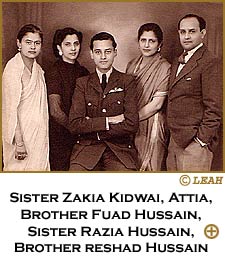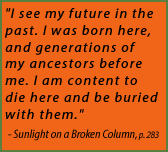7. Why Pakistan?  QUESTION: Let us jump forward for a second, looking back at it from today. Let us say there were a lot of problems at that time in the creation of Pakistan. But today what seems to be happening in India, this right-wing Hindu push, does that in any way justify Pakistan retrospectively or not?
QUESTION: Let us jump forward for a second, looking back at it from today. Let us say there were a lot of problems at that time in the creation of Pakistan. But today what seems to be happening in India, this right-wing Hindu push, does that in any way justify Pakistan retrospectively or not?
ATTIA HOSAIN (AH): No. Because it is because there was that [a separate Pakistan] they can turn on us and say, you have got your homeland, go to it. You made it and who are you here now? Why, you as a minority. The worst of them can say: why are you as a minority trying to get any special privileges. They talk of the vote bank. Ultimately, let us face it in the West. You are seeing it now in the new imperialism that it is that, that matters who has the power in their hands? Why are people fighting for religion?  I mean, I believe in the sincerity of the Quaid [Mohammed Ali Jinnah], right, because I thought he was an honest and sincere man. But I believed he was blinkered. I, who really respected him and was fond of him, and because he was kind to me. I think he didn't know history enough. What was happening in the Muslim world any way? What had happened that could not teach us a lesson? That is what I feel, that the people who pushed it were not believers in religion anyway, and to say it was not founded on religion, is not true, because the cry was 'slam in danger.'
I mean, I believe in the sincerity of the Quaid [Mohammed Ali Jinnah], right, because I thought he was an honest and sincere man. But I believed he was blinkered. I, who really respected him and was fond of him, and because he was kind to me. I think he didn't know history enough. What was happening in the Muslim world any way? What had happened that could not teach us a lesson? That is what I feel, that the people who pushed it were not believers in religion anyway, and to say it was not founded on religion, is not true, because the cry was 'slam in danger.'
Q: Some people would argue that that cry of 'Islam is in danger' actually represented 'your economic position is in danger?' AH: Why it is the economic position in danger? Because the economic position could not be improved by going somewhere else. The people, who left by the way and took their wealth with them, were people already rich in India, the Ismailis and the trading people. Q: Well, what I mean by middle class, lets say a Punjabi, lower middle class family like my father's family. They would be educated. They would try and enter the Magistrate [courts] or Civil Service, whatever, and they would see 70 - 80 per cent of the employees were Hindus and they would feel that they could never move up. AH: They could if they thought to move up as some did. RightŠ.. People did. But if you leave the people behind, by what right do you then claim that all Muslims are your friends in India? In the sense that every time any thing happened or went wrong, they would raise a clamor in Pakistan. I said that to Arshad [when he was Foreign Minister. Arshad what rights have you? You are passing a death sentence on them, are you going there to help them? Who are they to you now? Nothing. But I would like to know whom the homeland was being made for? For the people who were already there, the Punjabi Muslims, the Pathans, Sindhi or who? Q: The traditional story in Pakistan is that the real people who fought the hardest for Pakistan were from U.P. AH: Okay, so they were. Q: So they are the people who actually wanted this homeland whereas the Punjabis and Sindhis and Pathans say - AH: Well of course they did. That proves my point that they wanted what they could not have, they thought right. So don't talk about it as Islam and the Islamic State. Their religion is in danger? No. But if you talk of people a middle class, leaving them, being like as D.H. Lawrence said, how beastly the bourgeois is? And leaving everybody behind. You know during my left wing days I was ashamed of being born into a Taluqdari family and for eight hundred years having been something a part of the world in that Barabanki area [U.P. area]. I am not ashamed now because looking back on it, I think we were not as evil as the people who followed, who were grabbing in the whole world. For me it has been that I feel that the real power behind all these foundations of nations or countries has been,political aims. We are watching it now. It is happening. It is happening today in the Middle East. There will be a new middle area of Iraq carved out for the same purpose. I am not prepared to believe that Pakistan was given away by the British in a generous way accepting that there will be a just division. This wasn't a just war we had just witnessed. Just now what happened to the Indian sub-continent? Weakened, with one part of it opened to one side, one great power, and one part will, therefore, open to the other great power. So for me, politically, there can be no sense in this. Yes, of course after 1947 the Muslims had to suffer more in India. It is a bigger Muslim population than in Pakistan. So what is the justification, for whom, for the benefit of few from the middle class to get rich? Q: In all honesty, the population of Pakistan and Bangladesh put together is bigger than the number of Muslims left in India. AH: The Bangladeshis, why did they have to fight [to separate from Pakistan in 1971]? Now, if it had been Islam and if it had been purely economic benefits, why would they have to fight? Because they were used by an Imperial West Pakistan. Q: But, you know it is interesting talking to Bengali, Bangladeshis whom I interview today - still they are very proud of their involvement in Pakistan in 1947, even though they didn't like being a part of Pakistan. AH: Well, what else are they going to be? Having done what they did, and then why they have that battle? Why did they have the fight [civil war of 1971]? Q: Because we dealt with them terribly. It was justified. AH: So, wait a minute. So how did that [partition in 1947] help them? Q: I think they felt that they were really caught in a Hindu economic stranglehold. AH:Well, of course, but the stranglehold was not lifted by a partition. In fact, the stranglehold became worse. East Bengal and West Bengal complemented each other. Raw material, one side somebody developing an industry, the other side. They are the poorest nation now. Right? Q: Right. AH: All accounts and history have proved that 'yes,' there is a logic in history that the fight for unity should have won against all odds, not the fight for disunity. That is what I am trying to say, that the same sacrifices, the same thing. My friend [U.P. Chief Secretary] then said to me 'Where are all great leaders? Where they have gone? When I have to do the shooting on my own, co-religionists? I said, the English said that. But you have had wars between sovereign countries [India and Pakistan in 1948, 1965 and 1971]. Is that better or worse than rioting? No, there was no great, unified structure in that subcontinent before the British made it happen. But once it was there, had there not been this fissiparous [secessionist] movement and the same strength, as I said, put into peace, we wouldn't have had these tragedies of today. All right, I will forget all that happened, politically, economically, and the middle class has become [richer]. Yes, my own relatives are very rich in Pakistan. Most of those of us who were great feudals, what have you now? Finished, because it is a world for business. Certainly in Pakistan there were no land reforms like they were in India, which ruined our [the feudal] lot. But think about the alternatives. We are now seeing in actual fact history repeating itself on a huge terrible scale in the Middle East. What the search for power, the search for economics can do when human beings are forgotten, when it's abstractions, when we talk of statistics, when we talked of and never think that there is a living creature at the other end. You see, I am sure there must have been many many, like I was then, believing in a new world and that new world could not think of a world that could only be based on hate and violence. After all think of the great Muslims That then did emerge from that time. I mean, Rafi Ahmad Kidwai [relative of her father's family and Congress Party leader] was a remarkable man. An absolutely remarkable man who lived with nothing, gave everything he had away, saved so many lives during that time. Q: Why did so many of these U.P. Muslims from your class and background go to Pakistan? AH: Because of getting a better life, that is what I am trying to say. It is a search for a better life. Say that to me and I will say 'yes'. But don't talk about Islam and religion. > Image © The Literary Estate of Attia Hosain (LEAH) |
| |
| SOUNDS
| HOME